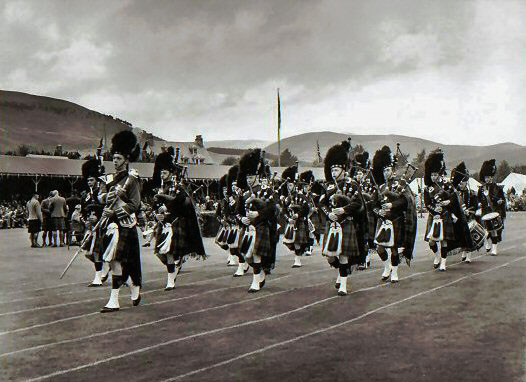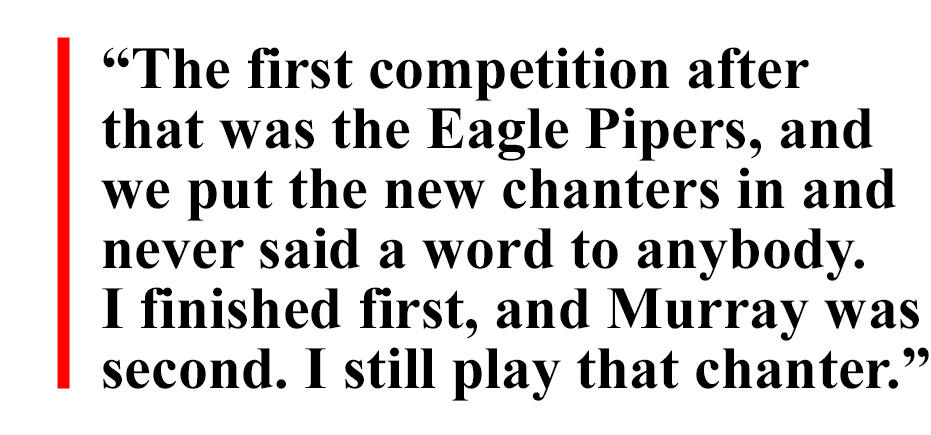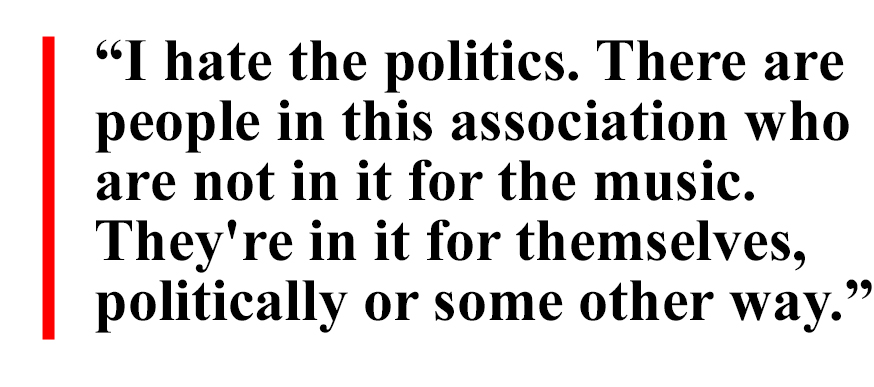Jimmy McIntosh: the pipes|drums Interview from the Archives – Part 3
In Part 1 of Jimmy McIntosh: the pipes|drums Interview from the Archives, the late piping great discussed the piping climate of 1994, including problems between the EUSPBA and the PPBSO, testing and accreditation,, including problems between the EUSPBA and the PPBSO, testing and accreditation, and other issues of the time.
In Part 2, he went into more detail about the teaching styles of Robert Brown, Robert Nicol, Willie Ross and Donald MacLeod, and here, in Part 3, McIntosh talks about his favourite tunes, getting into the Cameron Highlanders as a “band boy,” and the evolution of the historic Naill pipe chanter, among many other topics.
 Jimmy McIntosh: the 1994 pipes|drums Interview from the Archives – Part 1
Jimmy McIntosh: the 1994 pipes|drums Interview from the Archives – Part 1
February 17, 2021
 Jimmy McIntosh: the pipes|drums Interview from the Archives – Part 2
Jimmy McIntosh: the pipes|drums Interview from the Archives – Part 2
Jimmy McIntosh passed away in his ninety-sixth year on February 8, 2021, leaving behind a legacy of study and teaching, impacting hundreds of pipers worldwide.
Part 3
![Jimmy McIntosh (right) discussing a point with Archie Cairns at the 1981 Cambridge Highland Games, Cambridge, Ontario. [Photo pipes|drums]](https://www.pipesdrums.com/storage/2021/03/McIntosh_Jim_Cairns_Archies_Cambridge1981.jpg)
Jimmy McIntosh: I would have to say “Lament for the Children.” I get so emotionally involved with that tune. It lends itself to that. That composition changed piobaireachd playing; it changed piobaireachd composition. The compositions prior to that were mostly bottom-hand pieces, where that piece is all on the top hand. It’s so well constructed that you become so emotionally involved in it, and you feel yourself doing things with it that project sadness.
“The Earl of Seaforth’s Salute” is a tremendous tune because of the high G’s in it. And “Patrick Og” Bob Brown reckoned was the most complete tune that was written. I’m not saying that I like it that much, but it is a wonderful tune as well. “The Park” is a very musical tune that I like playing. “Donald Ban” is such a bold tune. There are so many great tunes.
p|d: Let’s talk a bit about your involvement in pipe bands.
JM: I played when I was a boy in the local Broughty Ferry Pipe Band. I joined the Camerons in October 1939, and I went right into the pipe band. There were five people who had Pipe-Major certificates in the band. Captain John MacLellan was the lance corporal, Willie McCrostie, the reedmaker, was a lance-corporal, Malcolm MacPherson was a piper in the band, Evan MacRae was a piper in the band, Mickey MacKay, who won the Gold Medal, was a piper in the band. The band was full of great players, and that is what I went into when I was 14.
p|d: You lied about your age?
JM: No, my father took me up to Dundee, unknown to me, to the recruiting office, and the place was packed with conscripts, and he went to this recruiting sergeant and said he wanted to join his boy in the Cameron Highlanders as a band boy. So I was enlisted into the Cameron Highlanders, I didn’t have any say, and neither did my mother. I landed in the Cameron barracks in October 1939 with a set of bagpipes and a suitcase. I was in the Camerons for 10 years. I played against Donald MacLeod at my first competition at Strathpeffer when I was 15. Donald was the Pipe Major of the band at that time, and there was a competition at Strathpeffer games. When I came out of the army in 1949, I joined the MacKenzie pipe band in Dundee, which was Grade 1. I went to the City of Dundee Pipe Band as pipe-major; they were Grade 2, and had quite a success there. At the last competition of the season at Dunblane, we won both piping and drumming. John Weatherston’s band at that time was the 422 Regiment, and that was their last competition in Grade 2, and we beat them, and they were upgraded at the end of that season.
The National Cash Register Company, NCR, approached me to form a band in 1957, and we had quite good success. In the SPBA quartets, when it was an Open competition, we were second to the Edinburgh Police, and Renfrew and Shotts were third and fourth. In the second year, the result was Edinburgh Police, Shotts, NCR and Renfrew. After that, they started the grading system, and we were put in Grade 2. We were runners-up in the World’s twice in Grade 2. I stayed in the band until 1964.
JM: I got frustrated with the amount of time I put out on band members’ pipes and all that sort of stuff, and the lack of results after working with people so hard. I decided then to go back into solo playing and to try to win the Gold Medal. In 1965 I went to Bob Brown and asked him to teach me. I hadn’t competed for about 22 years, and I went to Nethy Bridge with another local guy, and I came away with two prizes. I was second in the march and third in the strathspey & reel, and I hadn’t competed since 1945, so that gave me some confidence.
p|d: What do you think of bands today?
JM: The standard of the good bands is tremendous, far different than when I played in bands, although when I played in the band the quality of the march, strathspey & reel was better than it is today. The medley is different. As a point of interest, we won the first medley competition that was ever tried out in Scotland. When that was introduced at first, they tried it out at the branch competitions, and it was tried out at the Dundee, Perth & Angus branch. Iain McLeod judged it, and the NCR mini band won by seven points. I think the bagpipe sound of the good bands is tremendous. The execution is really great, I mean a lot of the stuff is technically very difficult to play, the quality of the music is good and very entertaining.
There must be a balance between traditional and contemporary. All judges have been reared with traditional music, and they’re tuned to traditional music, and it’s just natural that they want to hear the balance of traditional music in a performance. Traditional music, to my mind, has less chance of sounding monotonous than contemporary music. If you’re playing a whole program of contemporary music, there’s a feeling of monotony in the rhythm sometimes, and that’s less likely to happen with traditional music because that’s what we’re accustomed to hearing, that’s natural for us.

In band competition, you compete to win – at least I did. Bob Nicol used to say, “Let the other guy do all the work, and you pick up the prizes.” If you’re in a competition, you’re in there to win, not always to make a musical statement. There are other platforms and opportunities to do that, with recordings and what have you.
p|d: You were directly involved with the design of the Naill chanter, perhaps the best solo chanter ever developed. How did you get involved with Naill, and do you receive royalties for the “intellectual property” you provided in creating the product?
JM: No, I have never even received thanks. My involvement with the Naill chanter came about when I was still in Dundee. I received a call from Les Cowell from England, who asked if I would be interested in selling his bagpipes. I said I’d have to see them first. He sent ex-Pipe-Major John Roe of the Scots Guards to Dundee with two sets of bagpipes, and I didn’t like them at all. He asked what was wrong with them, and I said, Well, the chanter’s no use and the drones are no use, and the design is wrong. Les Cowell asked if I would correct them, and I said that I would have a go at it. I had just finished engineering, and I still had a few pals who worked in engineering.
 So, I got a pal of mine, and I told him what my idea was, and I told him to put down a template on the size. I got reamers made, and I went down to England to Les Cowell’s house on the weekend. I took Murray Henderson with me to blow the pipes so that I could put the chanters in and listen and work with the chanters. We drove to England, and we couldn’t find the place. But then I saw D. Naill over a sewing machine shop. They were in business repairing sewing machines. In the back of the shop, they had one turning lathe, and that’s where he was making bagpipes. We spent the weekend trying to correct the pitch and tone and I took away two chanters, one for Murray Henderson and one for myself. The first competition after that was the Eagle Pipers, and we put the new chanters in and never said a word to anybody. I finished first, and Murray was second. I still play that chanter.
So, I got a pal of mine, and I told him what my idea was, and I told him to put down a template on the size. I got reamers made, and I went down to England to Les Cowell’s house on the weekend. I took Murray Henderson with me to blow the pipes so that I could put the chanters in and listen and work with the chanters. We drove to England, and we couldn’t find the place. But then I saw D. Naill over a sewing machine shop. They were in business repairing sewing machines. In the back of the shop, they had one turning lathe, and that’s where he was making bagpipes. We spent the weekend trying to correct the pitch and tone and I took away two chanters, one for Murray Henderson and one for myself. The first competition after that was the Eagle Pipers, and we put the new chanters in and never said a word to anybody. I finished first, and Murray was second. I still play that chanter.
p|d: You don’t hesitate to become politically involved in piping matters, for example, the formation of the Competing Pipers Association, president of the EUSPBA, judging committees, music boards, and so forth. Do you think this heavy involvement has advanced or damaged your piping career?
JM: I don’t know if it has done either. The first thing I became involved in probably was the CPA. I formed the CPA, but I never considered it politics. The year before the CPA was formed, at Inverness George Lumsden played at quarter to eleven at night in the Gold Medal; he was the last competitor. Something had to be done, and it was clearly stated that the next year the contest was going to be changed. There were a couple of people making big noises that they were going to change things, and I thought, If that’s going to happen if anything is going to be done here, the best people to do it are the competing players. I wrote to Inverness and asked if they would allow me to hold a meeting at midday on the Gold Medal day, and they said yes, so I made up a flier, and every competitor got one when they came in. I told them that competition organizers were planning to change the whole system, and I proposed that we form an association. But I never considered that politics.
p|d: Have you had problems being president of the EUSPBA and simultaneously teaching and judging?
JM: No, I don’t think so. I never had any inclination or desire to be president of the EUSPBA. After I came to the States I was invited to be on the adjudication advisory board, and we did a seminar in New Jersey. The following week the person who was then president said he was dissolving the adjudication advisory board. There was a whole lot of conflicting stuff going on – it was politics that I really couldn’t understand. I hadn’t long been here, so I didn’t know anything about the political side of things. But it seemed to me that, as a person who has been involved in piping, this association needed people who understand the concerns of piping.
 p|d: You saw it as an opportunity to help?
p|d: You saw it as an opportunity to help?
JM: That’s right, I said the only way we’re going to get anything done here is if I go in there in the president’s job and try to change things in the association and try to get young people involved in it. People said to me, Well, if you don’t do it nobody else is going to do it. I really didn’t want to be involved. I liked being on the adjudication advisory board, the examinations that I compiled and all that sort of stuff was more like what I saw as beneficial to the association and to piping generally. The morning after I was elected, I decided that under my administration in the EUSPBA, from then on, all business was going to be conducted on top of the table, not under it. The association belongs to the members. I get no personal benefit out of the association, and I have done everything I need to do in my piping career without that.
I’ll be finished as president in November, and I’ll be free. I can’t wait until that happens. I’ve enjoyed working and doing things for the association. I’ve introduced many things that are beneficial, and young people are actually clambering to get in office, and they wouldn’t have gone near it before.
But I hate the politics. There are people in this association who are not in it for the music. They’re in it for themselves, politically or some other way.
Watch for the part 4, the final installment of our 1994 Archive Interview with Jimmy McIntosh in the next while.
Related
 Jimmy McIntosh: the 1994 pipes|drums Interview from the Archives – Part 1
Jimmy McIntosh: the 1994 pipes|drums Interview from the Archives – Part 1
February 17, 2021
 Jimmy McIntosh: the pipes|drums Interview from the Archives – Part 2
Jimmy McIntosh: the pipes|drums Interview from the Archives – Part 2



NO COMMENTS YET